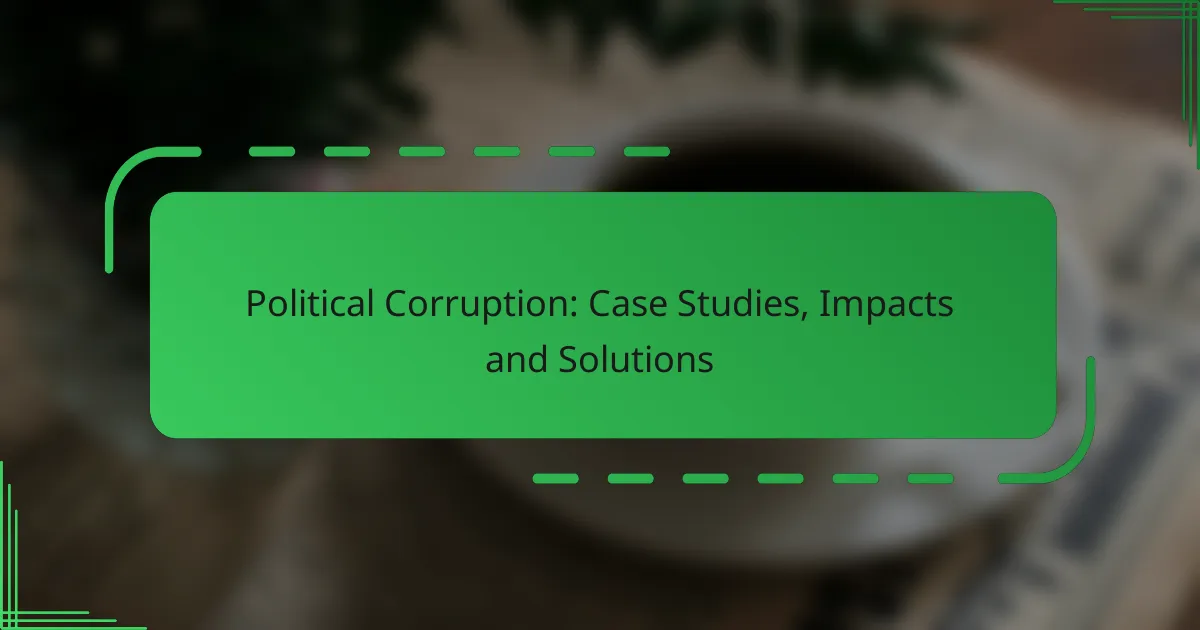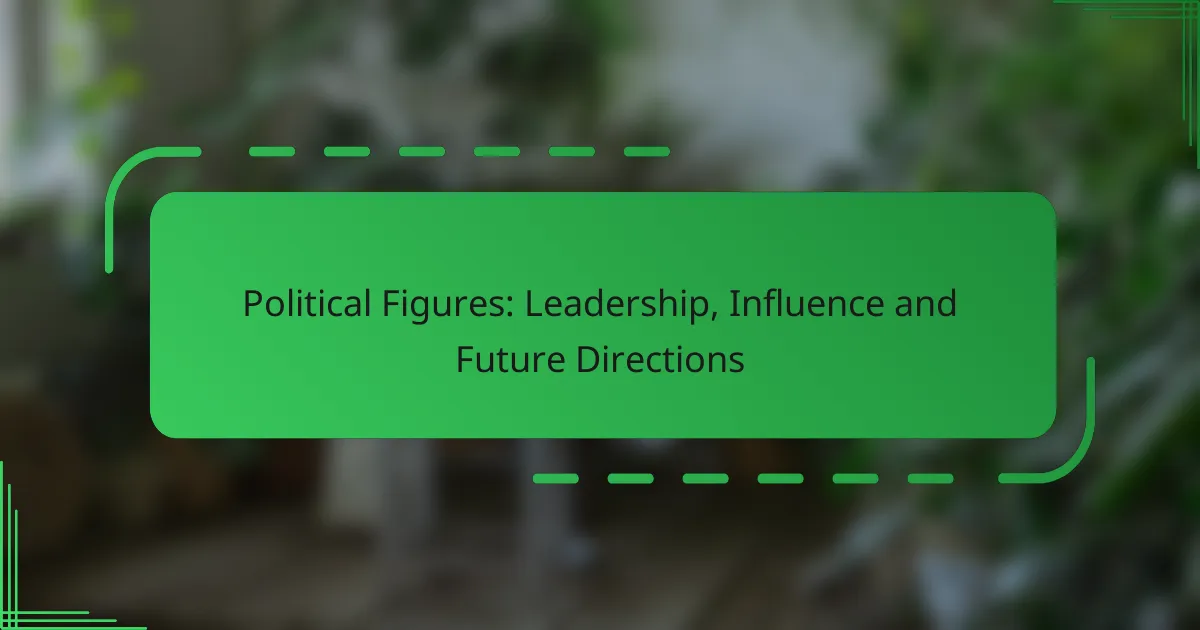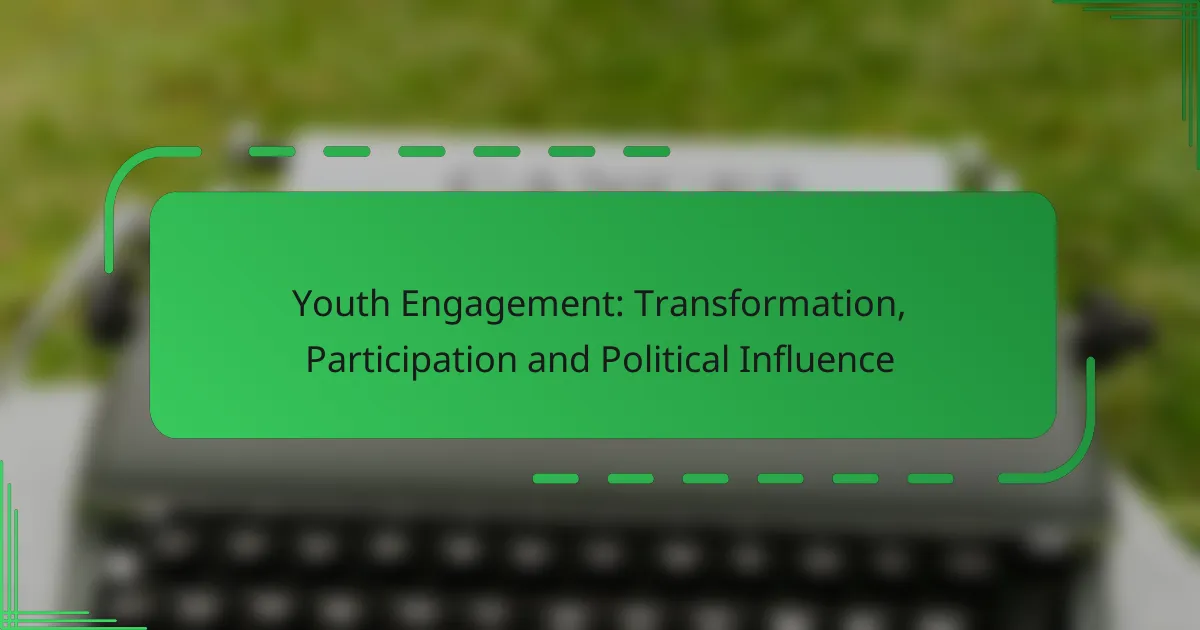Political corruption poses a significant threat to democratic institutions and societal well-being, eroding public trust and exacerbating inequality. By examining notable case studies, we can better understand the various forms of corruption and their far-reaching impacts. Addressing this issue requires comprehensive solutions that enhance transparency, reform campaign finance, and empower citizens to hold their leaders accountable.
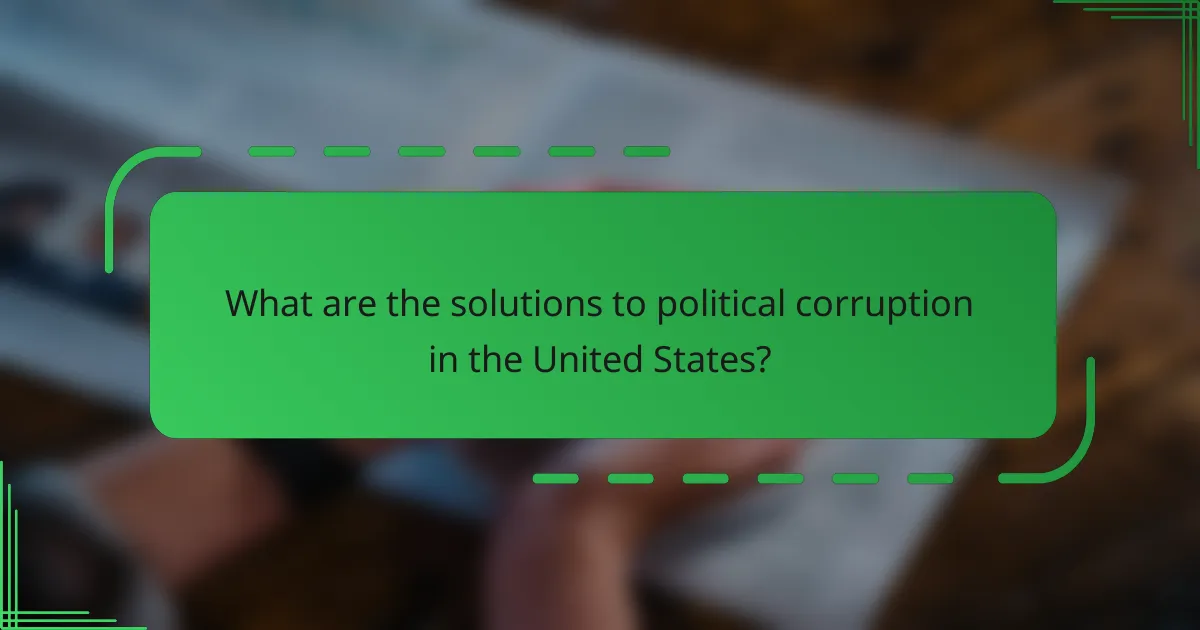
What are the solutions to political corruption in the United States?
Solutions to political corruption in the United States focus on enhancing transparency, reforming campaign finance, protecting whistleblowers, raising public awareness, and leveraging technology. Implementing these strategies can significantly reduce corrupt practices and foster a more accountable political environment.
Strengthening transparency laws
Strengthening transparency laws involves enacting regulations that require government officials and agencies to disclose financial interests, lobbying activities, and decision-making processes. This can help deter corrupt behavior by making it more difficult for officials to engage in unethical practices without public scrutiny.
For example, states can adopt laws mandating the disclosure of campaign contributions and expenditures, allowing citizens to track the flow of money in politics. This transparency can empower voters to make informed decisions and hold elected officials accountable.
Implementing campaign finance reform
Implementing campaign finance reform aims to limit the influence of money in politics by establishing stricter rules on donations and expenditures. This can include capping individual contributions, requiring full disclosure of funding sources, and promoting public financing of campaigns.
For instance, some states have adopted matching funds systems, where small donations are matched by public funds, encouraging candidates to seek grassroots support rather than relying on large donors. Such reforms can help level the playing field and reduce the risk of corruption.
Enhancing whistleblower protections
Enhancing whistleblower protections is crucial for encouraging individuals to report corruption without fear of retaliation. Strong legal safeguards can ensure that whistleblowers are protected from job loss, harassment, or legal consequences, making it safer for them to come forward with information.
Organizations can implement internal policies that promote a culture of reporting and provide anonymous channels for whistleblowers to disclose wrongdoing. This can lead to increased detection of corrupt activities and foster a more ethical workplace environment.
Increasing public awareness and education
Increasing public awareness and education about political corruption is essential for fostering a vigilant citizenry. Educational programs can inform the public about the signs of corruption, the importance of transparency, and how to engage in advocacy for reform.
Community workshops, online resources, and school curricula can all play a role in building awareness. When citizens are informed, they are more likely to participate in the political process and demand accountability from their leaders.
Utilizing technology for accountability
Utilizing technology for accountability can enhance oversight and transparency in government operations. Digital tools such as online databases for tracking campaign contributions, public spending, and government contracts can make it easier for citizens to access information and hold officials accountable.
Moreover, social media platforms can serve as powerful tools for mobilizing public opinion against corruption. By leveraging technology, citizens can share information, organize campaigns, and advocate for reforms more effectively, creating a more informed and engaged electorate.
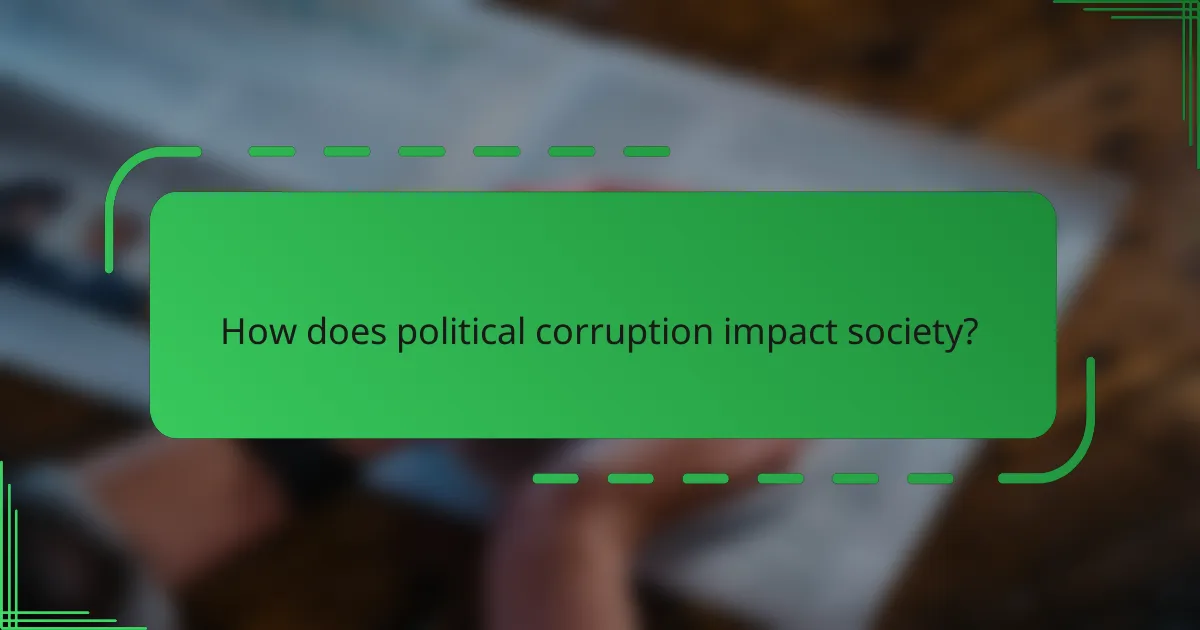
How does political corruption impact society?
Political corruption significantly undermines societal structures by eroding trust in institutions, creating economic disparities, and exacerbating social inequality. Its effects ripple through communities, affecting everything from governance to individual livelihoods.
Erosion of public trust
Political corruption leads to a profound erosion of public trust in government and institutions. When citizens perceive that officials prioritize personal gain over the common good, they become disillusioned and disengaged from civic participation.
This lack of trust can result in lower voter turnout and increased apathy towards political processes, making it easier for corrupt practices to persist. Restoring trust requires transparency, accountability, and active citizen engagement.
Economic consequences
The economic consequences of political corruption can be severe, often leading to inefficient allocation of resources and stunted economic growth. Corruption can deter foreign investment, as businesses seek stable environments with transparent regulations.
Additionally, public funds may be misappropriated, leading to underfunded public services such as education and healthcare. This can create a cycle of poverty, where the most vulnerable populations suffer the most from the lack of essential services.
Social inequality
Political corruption exacerbates social inequality by disproportionately affecting marginalized communities. When resources are siphoned off by corrupt officials, those in need often receive less support, widening the gap between the wealthy and the poor.
Furthermore, corruption can lead to unequal access to opportunities, such as education and employment, perpetuating a cycle of disadvantage. Addressing corruption is crucial for promoting social equity and ensuring that all citizens have a fair chance to thrive.
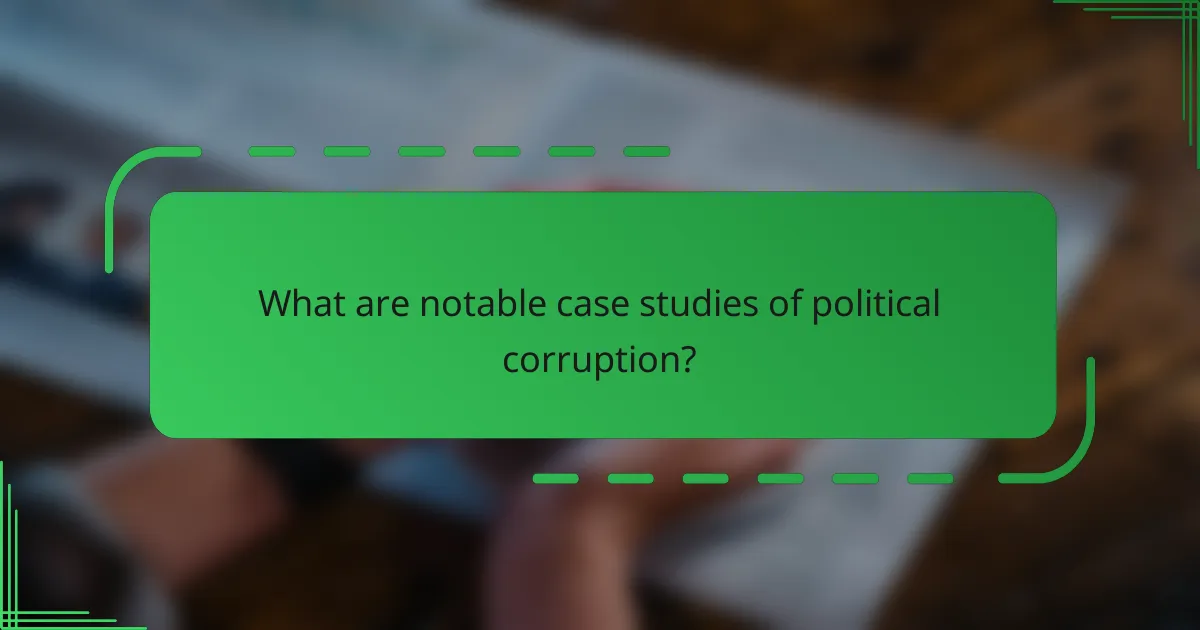
What are notable case studies of political corruption?
Notable case studies of political corruption illustrate the various forms and impacts of unethical practices in governance. These examples reveal how corruption can undermine public trust, distort policy-making, and lead to significant social and economic consequences.
Watergate scandal
The Watergate scandal was a major political event in the United States during the early 1970s, involving a break-in at the Democratic National Committee headquarters and subsequent cover-up efforts by President Nixon’s administration. This case highlighted the dangers of abuse of power and led to Nixon’s resignation, marking the first time a U.S. president stepped down from office due to scandal.
Key takeaways from Watergate include the importance of transparency and accountability in government. The scandal prompted reforms aimed at increasing oversight, such as the establishment of the Federal Election Commission and stronger campaign finance laws.
Bribery in the Illinois state government
Illinois has a long history of political corruption, with numerous officials convicted for bribery and other unethical practices. A notable case involved former Governor Rod Blagojevich, who was arrested in 2008 for attempting to sell Barack Obama’s vacant Senate seat, among other charges.
This case underscores the need for stringent anti-corruption measures at the state level. Illinois has since implemented reforms, including stricter lobbying regulations and increased penalties for corrupt activities, to restore public confidence in governance.
Operation Car Wash in Brazil
Operation Car Wash (Operação Lava Jato) is a vast corruption investigation that began in Brazil in 2014, uncovering a massive scheme involving bribery, money laundering, and political collusion among state-controlled companies and politicians. This operation revealed deep-seated corruption within the Brazilian political system, implicating high-ranking officials and business leaders.
The impact of Operation Car Wash has been profound, leading to significant political upheaval and the imprisonment of several influential figures. It has prompted discussions on the need for comprehensive reforms to combat corruption, including enhanced judicial independence and greater public engagement in governance.
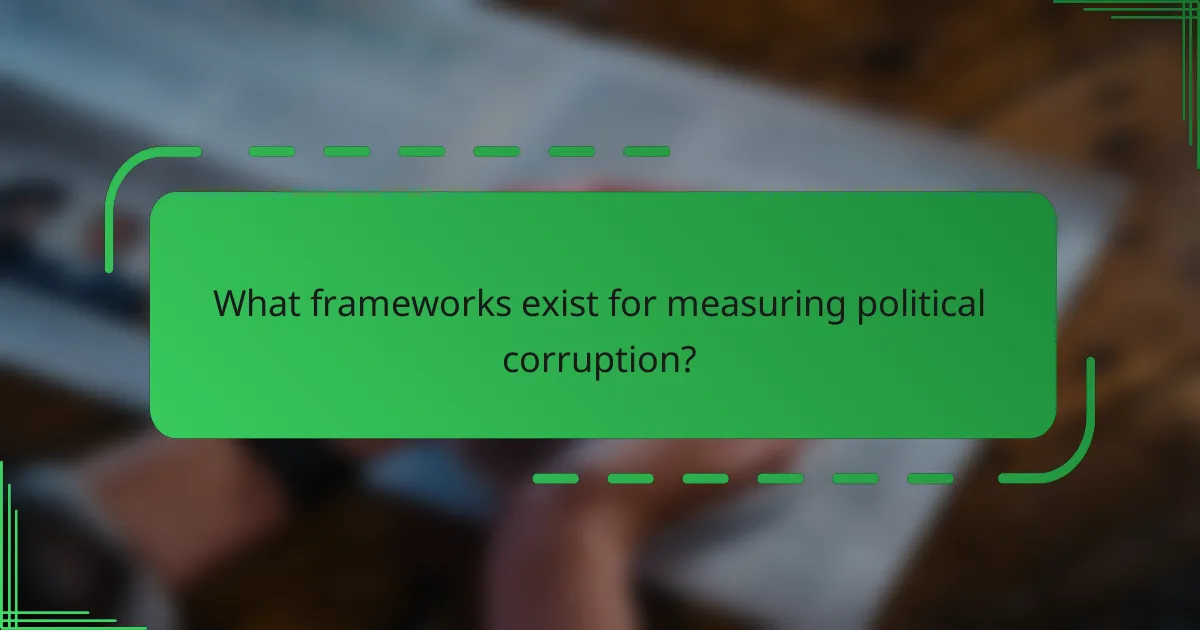
What frameworks exist for measuring political corruption?
Several frameworks are designed to measure political corruption, providing insights into the prevalence and impact of corrupt practices. These frameworks often rely on surveys, expert assessments, and quantitative data to evaluate the integrity of political systems across different countries.
Corruption Perceptions Index
The Corruption Perceptions Index (CPI) is a widely recognized tool that ranks countries based on perceived levels of public sector corruption. It uses a scale from 0 to 100, where 0 indicates high corruption and 100 signifies a corruption-free environment. This index is compiled from various sources, including expert assessments and opinion surveys.
Countries with a CPI score below 50 are generally viewed as having significant corruption issues. For example, nations in Eastern Europe and Central Asia often score in the low 30s to mid-40s, indicating a need for reform. Understanding CPI scores can help policymakers and citizens identify areas needing attention and improvement.
World Governance Indicators
The World Governance Indicators (WGI) provide a broader perspective on governance, including political stability, government effectiveness, and regulatory quality, alongside corruption. The WGI uses a composite index derived from multiple data sources, offering a more comprehensive view of governance issues in different countries.
Among the six dimensions measured, the “Control of Corruption” indicator specifically assesses the extent to which public power is exercised for private gain. Countries with low scores in this area often experience challenges in governance and economic development. Stakeholders can utilize WGI data to benchmark progress and implement targeted anti-corruption strategies.
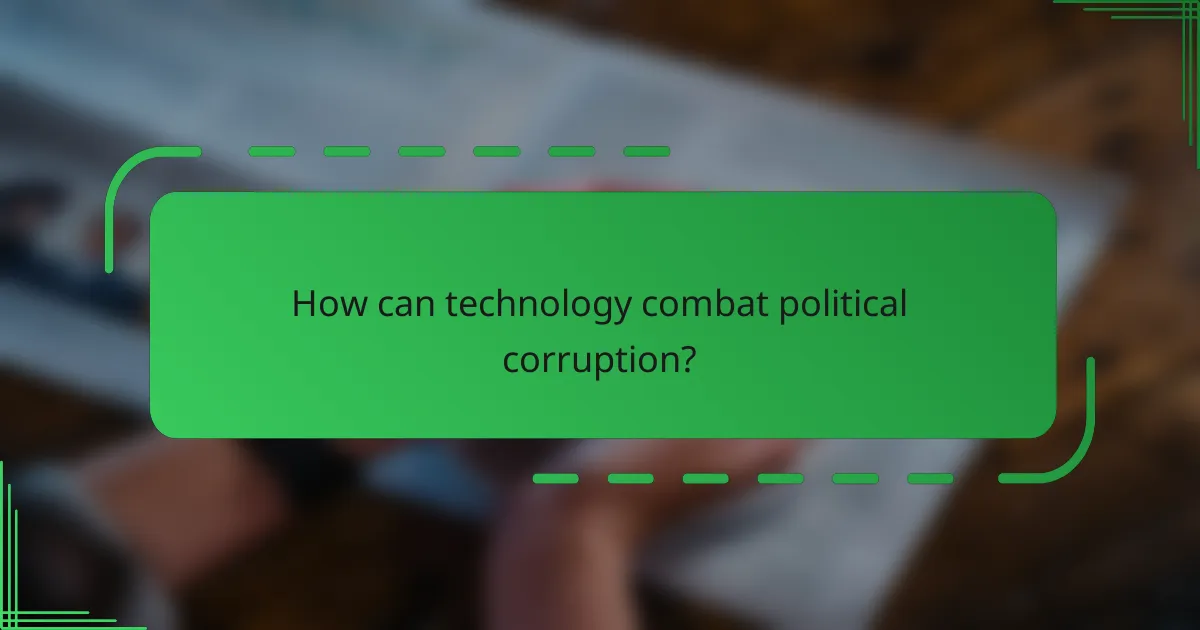
How can technology combat political corruption?
Technology can significantly reduce political corruption by enhancing transparency, improving fraud detection, and facilitating reporting mechanisms. By leveraging innovative tools, governments and organizations can create more accountable systems that deter corrupt practices.
Blockchain for transparency
Blockchain technology offers a decentralized and immutable ledger that can enhance transparency in government transactions. By recording public contracts, expenditures, and asset ownership on a blockchain, stakeholders can easily verify information, reducing opportunities for corruption.
For instance, countries like Estonia have implemented blockchain solutions for public services, ensuring that citizens can track government actions in real-time. This level of transparency can discourage corrupt behavior by making it more difficult to manipulate records without detection.
Data analytics for fraud detection
Data analytics can identify patterns and anomalies that suggest fraudulent activities in political systems. By analyzing large datasets from public records, financial transactions, and social media, authorities can pinpoint irregularities that warrant further investigation.
For example, machine learning algorithms can flag unusual spending patterns in government budgets, alerting officials to potential misuse of funds. Implementing such analytics can lead to quicker responses to corruption and more efficient allocation of resources.
Online platforms for reporting corruption
Online platforms provide a safe and accessible way for citizens to report corruption. These platforms can offer anonymity and protection, encouraging more individuals to come forward with information about corrupt practices without fear of retaliation.
Countries like Mexico have established online reporting systems that allow citizens to submit complaints directly to authorities. Such initiatives not only empower citizens but also help governments gather crucial data to tackle corruption effectively.
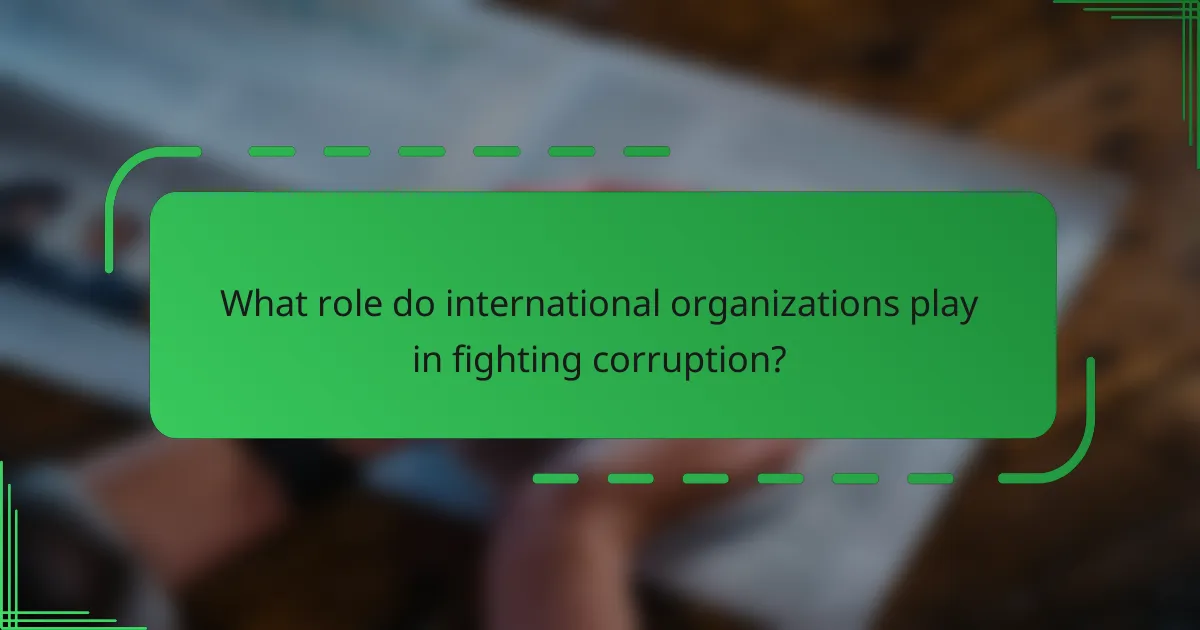
What role do international organizations play in fighting corruption?
International organizations play a crucial role in combating corruption by establishing frameworks, promoting best practices, and facilitating cooperation among nations. They provide guidelines and resources that help countries develop their anti-corruption strategies and strengthen governance.
United Nations Convention Against Corruption
The United Nations Convention Against Corruption (UNCAC) is a key international treaty aimed at combating corruption globally. It encourages countries to implement effective measures to prevent corruption, criminalize corrupt practices, and promote international cooperation in investigations and prosecutions.
Countries that ratify the UNCAC commit to adopting legal and administrative measures that align with its provisions. This includes enhancing transparency in public procurement, improving the integrity of public officials, and fostering international collaboration to recover stolen assets.
For example, nations may establish anti-corruption agencies or improve whistleblower protection laws as part of their compliance with the UNCAC. By adhering to these standards, countries can create a more transparent and accountable governance environment, ultimately reducing corruption levels.
